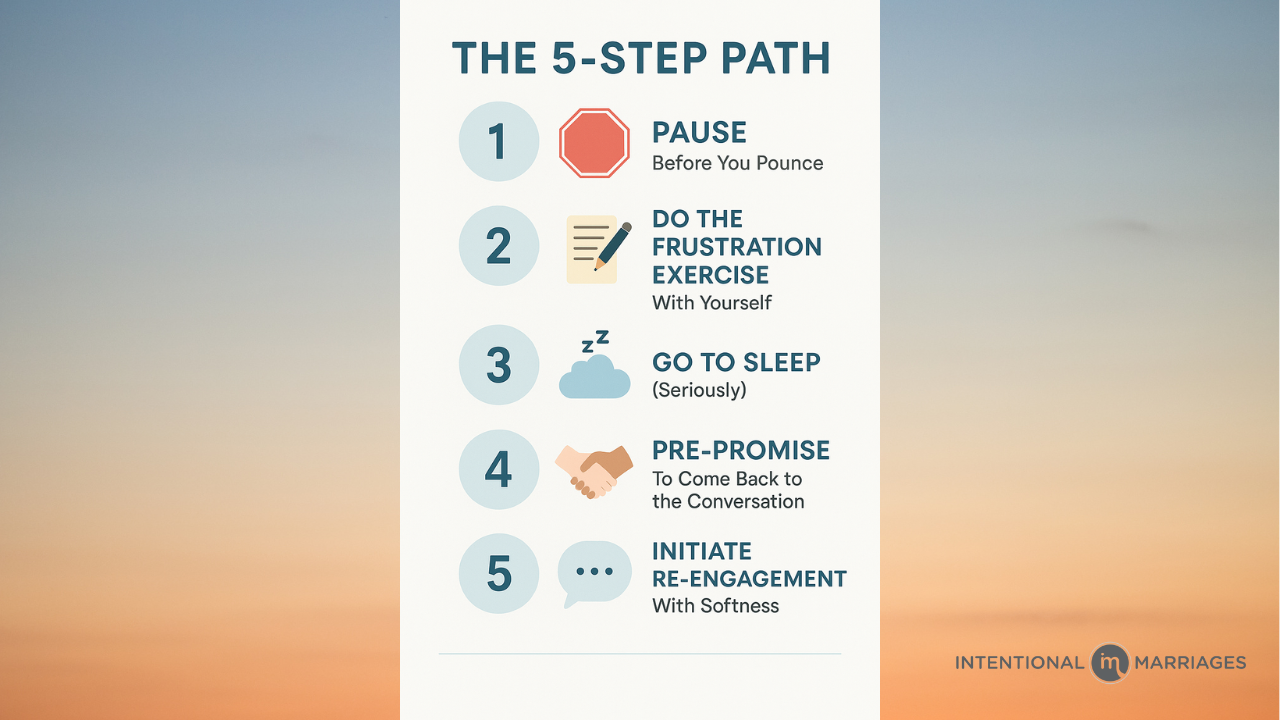5 Rules of Engagement: How to Fight Fair & Stay Connected
Jun 03, 2025
Conflict doesn’t have to drive a wedge between you, it can actually deepen intimacy when handled well. That was hard for us to believe until we practiced these 5 Rules of Engagement. Even the healthiest relationships experience tension.
The 5 Rules of Engagement help couples stay emotionally safe, even in the middle of frustration. These five steps create a roadmap for managing difficult conversations without doing lasting damage.
1. Pause Before You Pounce
Why it matters:
When emotions are high, logic is low. This is pure science. Once you're flooded, you're operating out of your amygdala, which isn't very logical or nice. Reacting in the heat of the moment often leads to defensiveness or regret. Pausing gives your nervous system a chance to reset, and your heart a chance to stay soft.
Pausing can be incredibly difficult for the tigers in the relationship, the ones who want to resolve things right away. For turtles, who naturally withdraw or shut down, pausing comes more easily (sometimes too easily).
How to do it:
Take a breath. Technically, breathe in 4 seconds through your nose (because it helps calm the parasympathetic system down) and out through your mouth for 8 seconds. This will help bring your flooded state from the amygdala back to the prefrontal cortex, where love and logic sit.
When we say pause, we mean literally pause when you find yourself getting heated. 🛑 Stop in mid-sentence and go focus on the next steps of breathing, taking a walk, putting ice on the back of your neck, etc...
2. Do the Frustration Exercise With Yourself
Why it matters:
While you're pausing, do the Frustration Exercise with yourself. Most people want to jump into “fixing” the other person. But the real work starts within. The Frustration Exercise helps you name what’s under your frustration, like feeling unseen, dismissed, or overwhelmed.
How to do it:
Ask yourself:
-
What am I really feeling right now?
-
What need is going unmet?
-
Is there a story I’m telling myself that might not be true?
By owning your part, you prepare to speak from vulnerability, not accusation. Research shows that accepting responsibility, even for a portion of the conflict, is the antidote to your partner becoming defensive.
3. Go to Sleep (Seriously)
Why it matters:
Contrary to popular advice, sometimes the best thing you can do is sleep on it. When we’re tired, our ability to regulate emotion plummets. Rest isn’t avoiding it’s investing in your future clarity.
Many quote Ephesians 4:26 — “Do not let the sun go down on your anger.” Unfortunately, this verse has led some couples to stay up all night trying to resolve everything in one sitting. We see it differently: the verse is a personal reminder to deal with your anger, not to demand your spouse fix it for you.
How to do it:
Set a clear pause: “I love you. I’m overwhelmed. Can we pick this up after we’ve both had some rest?” It’s not sweeping things under the rug, it’s sweeping away the fog.
4. Pre-Promise to Come Back to the Conversation
Why it matters:
Unresolved conflict leaves emotional loose ends. A promise to re-engage builds trust and signals that the relationship matters more than being “right.”
How to do it:
Don't try to come up with a time to come back in the moment. This should be done and agreed upon outside of any conflict. Agree on a timeframe to come back.
As a turtle who shuts down and doesn't want to come back to the conversation, this would make Russ very anxious. He’d want to push through in the moment, but I wasn’t emotionally available to do that. What helped was making a “pre-promise” that I would come back once I was no longer flooded. In the early days, it could take me a full day to process, but because Russ knew I would return, that gave him peace.
Following through on that promise builds trust and shows integrity.
5. Initiate Re-Engagement with a Gentle Start-Up
Why it matters:
Coming back to the conversation requires courage, but it sets the tone for reconnection. Gentle start-ups are proven to reduce defensiveness and increase openness.
How to do it:
Lead with vulnerability:
-
“I’ve had time to reflect. Can we try again?”
-
“I want us to be okay. Are you ready to talk more?”
Avoid blaming or re-litigating the issue. Focus on understanding, not winning.
Conflict doesn’t have to be chaotic or cruel. With these 5 Rules of Engagement, you can navigate tension with maturity, love, and intention. You’re not just resolving issues, you’re building emotional safety and trust, one respectful conversation at a time.
*****
Stay connected for future articles, events, and specials by clicking here!



